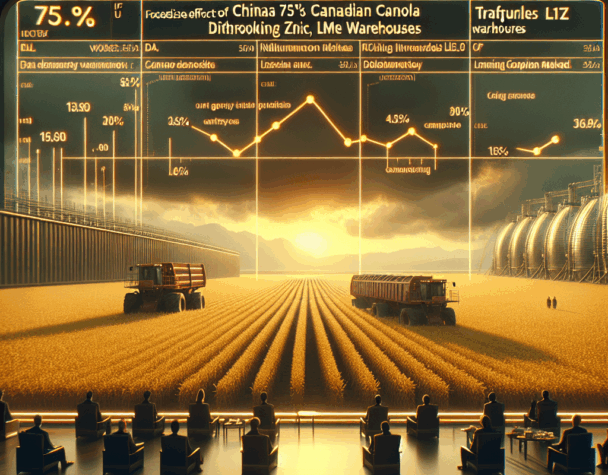
China's Canola Tariffs and Trafigura's Zinc Moves Shake Markets
Thu, August 14, 2025In recent developments, the global commodity markets have been significantly impacted by two major events: China’s imposition of substantial tariffs on Canadian canola imports and Trafigura’s strategic withdrawal of zinc from London Metal Exchange (LME) warehouses.
China’s Tariffs on Canadian Canola
On August 12, 2025, China announced provisional anti-dumping duties of 75.8% on Canadian canola imports. This decision escalates a trade dispute that began in August 2024 when Canada imposed tariffs on Chinese electric vehicles. The Chinese Ministry of Commerce justified the move by citing government subsidies and preferential policies benefiting Canada’s canola industry. These hefty duties effectively exclude Canadian canola from the Chinese market, which accounted for nearly C$5 billion in exports in 2024. The immediate market reaction saw Canadian canola futures plummet over 6%.
China, being the world’s largest canola importer, faces challenges in sourcing alternatives. While Australia might resume exports this year, replacing Canadian supply remains difficult. The Canadian canola industry and government have denied the dumping allegations, suggesting the tariffs are politically motivated. This development intensifies Canada’s trade tensions not only with China but also with the U.S., as Canadian goods are subject to tariffs from Washington. A final ruling on these duties is pending, but in the interim, Canadian farmers and traders brace for economic repercussions, including further price declines and market volatility. Read more
Trafigura’s Zinc Withdrawal from LME Warehouses
In a separate development, commodity trading giant Trafigura has been withdrawing significant quantities of zinc from LME warehouses in Singapore, with some shipments destined for the United States. The exact volume and reasons remain unclear, but zinc prices have risen 5% this month to approximately $2,850 per ton amid tightening supply concerns.
This move likely supports Nyrstar, a Trafigura subsidiary, which is preparing for a planned 21-day maintenance shutdown of its Clarksville, Tennessee smelter in mid-October. With an annual capacity of 125,000 tons, the plant’s temporary closure may necessitate imported supply to fulfill contracts. Additionally, some zinc is reportedly used in “rent-deals,” where firms delivering metal to warehouses share rental income despite not retaining ownership.
LME zinc stocks stood at 78,475 tons as of August 12—mostly in Singapore—now down over 30% since July 25. An additional 33,000 tons is set for delivery, with speculation that Trafigura may be preemptively shipping zinc to the U.S. ahead of potential import tariffs stemming from an ongoing trade investigation. Notably, zinc is included on the U.S. critical mineral list by the U.S. Geological Survey. Read more
Implications for Global Commodity Markets
These developments underscore the intricate interplay between trade policies and commodity markets. China’s tariffs on Canadian canola not only strain bilateral relations but also disrupt global agricultural trade flows, potentially leading to price volatility and supply chain adjustments. Meanwhile, Trafigura’s strategic zinc withdrawals highlight the complexities of commodity trading, where logistical decisions are influenced by factors ranging from maintenance schedules to anticipatory moves ahead of potential tariffs.
Market participants should remain vigilant, as such actions can have cascading effects across various commodities, influencing pricing, availability, and trade dynamics worldwide.
In conclusion, the recent actions by China and Trafigura serve as a reminder of the delicate balance within global commodity markets, where geopolitical decisions and corporate strategies can swiftly alter the landscape, necessitating adaptive measures from stakeholders across the supply chain.

